"You don’t believe in guns?" asks the incredulous but very angry gangster of the troubled and very frightened Irish screenwriter. "You think guns are like leprechauns, you dumb mick?"
It’s a reasonable inquiry, though the speaker is implying the answer to his own question. The scene is from Martin McDonagh’s Seven Psychopaths, and shows enraged Los Angeles mob boss Charlie (Woody Harrelson) teaching struggling Hollywood hack Marty (Colin Farrell) a severe lesson in the harsh actualities of violence. Marty can create fictional gun-crazed entertainment, but Charlie’s guns fire real bullets.
Seven Psychopaths ponders the crossover between screen violence and the real-world kind. How far is fiction a reflection of fact, and how much that’s fictional becomes factual through mimicry? Does cinema vilify or glorify brutality, and does violence in movies appal or appeal to audiences? Seven Psychopaths is a post-modern parable that raises questions about our hand-wringing hypocrisy. It’s brash, bloody and wickedly funny. "You can’t let animals die in the movies," one guy muses, "just the women."
The film opens with a view of the iconic HOLLYWOOD sign that waves across the rocky, undulating hillside over LA – so powerful, yet looking so unstable. The story follows Marty’s fluctuating fortunes as he seeks the creative drive to finish his new screenplay, entitled, appropriately enough, ‘Seven Psychopaths’. His best pal Billy (Sam Rockwell) isn’t much help. "What happens to the seven psychopaths in the end?" Billy wonders sceptically. "I don’t know what happens to them at the beginning, yet," Marty replies fretfully. Hollywood’s milieu so often affords people the dubious opportunity to fail to live up to their dreams.
Billy shares a dognapping scam with Hans (Christopher Walken), pinching pooches and returning them to the owners to claim the cash reward. But when Billy and Hans mistakenly steal the much-adored Bonnie, a shih tzu belonging to Charlie, they embroil Marty in a saga that offers painful real-life inspiration for his flagging script.
What develops is a blood-splattered medley of head explosions, machine gun shootings, gory death and sadistic torture (physical and psychological). McDonagh offers up a sanguinary spree, which includes razor-cut jugulars, limb dismemberment and self-immolation. The narrative line becomes blurred between the film we’re watching in our seats and the movie the Marty’s creating within the film’s world, to the extent that viewers are implicated in the messy collage of voyeuristic violence.

Anyone familiar with McDonagh’s previous work won’t be surprised by the blood and gore. From a London-Irish background, he emerged first as a playwright, absorbing influences from Pinter and Beckett – respectability and veiled menace from the former, sardonicism and absurdist humour from the latter. During the 1990s, productions such as The Pillowman and A Skull in Connemara established McDonagh’s aesthetic tone, in which scepticism stops only just short of outright cynicism, and characters might annihilate each other in spumes of bloody plasma and fragmented membrane. His more fortunate protagonists lost merely their teeth.
The playwright turned screenwriter in 2004 with his award-winning short Six Shooter, which features a profoundly unsettling performance from Irish actor Rúaidhrí Conroy. He plays a smart-arsed youth who torments a carriage of train travellers and, with subtle but pitiless logic, undermines several principles of personal and social decorum. Six Shooter also starred Brendan Gleeson, who later appeared with Colin Farrell and Ralph Fiennes in McDonagh’s first feature, In Bruges (2008), about inept gangsters running amok amid the Belgian town’s gothic, magical ambience: "It’s like some fucking fairy tale, isn’t it?" they wonder. Though sarcastic, In Bruges showed a thoughtful, haunting tone that finally confirmed McDonagh’s drama to have a humane, moral heart.
So it’s fitting that Farrell and McDonagh team up again for Seven Psychopaths, and that the counterpoints of fairy-tale sensibility and minatory nature also transfer from Bruges to Hollywood. L Frank Baum based his dreamlike city of Oz on LA, and many have followed that Yellow Brick Road hoping their dreams can come true.

In this context, realising one’s dreams means crushing someone else’s, and Seven Psychopaths is the latest movie to portray LA’s denizens as disaffected, disillusioned or deranged. Because LA was made through the film industry, no other city has been so often filmed, mostly unflatteringly, with cinema often degrading the place it calls home – see LA Story (1991), LA Confidential (1997) or Mulholland Drive (2001) for just a few examples.
Philip French wrote that no other habitat ever accommodated more disappointed or delusional writers than Hollywood. "I don’t have a drink problem," Marty insists, "I just enjoy drinking." To which Billy responds: "Well, one you’re a writer, two you’re Irish. You’re marked from birth." Farrell’s Marty joins William Holden’s Joe Gillis (Sunset Boulevard, 1950), Sterling Hayden’s Roger Wade (The Long Goodbye, 1973) and Nicolas Cage’s Kaufmans (Adaptation, 2002) among the troubled, trousered and traumatised scribblers hoping to shine amid Tinseltown’s glitter.
Seven Psychopaths is an extravagant romp, but it leans more to McDonagh’s sensationalist rather than thoughtful side. There are some strong performances – including a cameo from Tom Waits – but, as the story develops, accommodating so much talent causes the narrative to sprawl. This might be McDonagh’s deliberate symbolism of LA itself but the picture’s centre becomes unclear. Still, McDonagh enthusiasts will enjoy much in this movie, set in a world where reality and fantasy are always reflecting each other.


